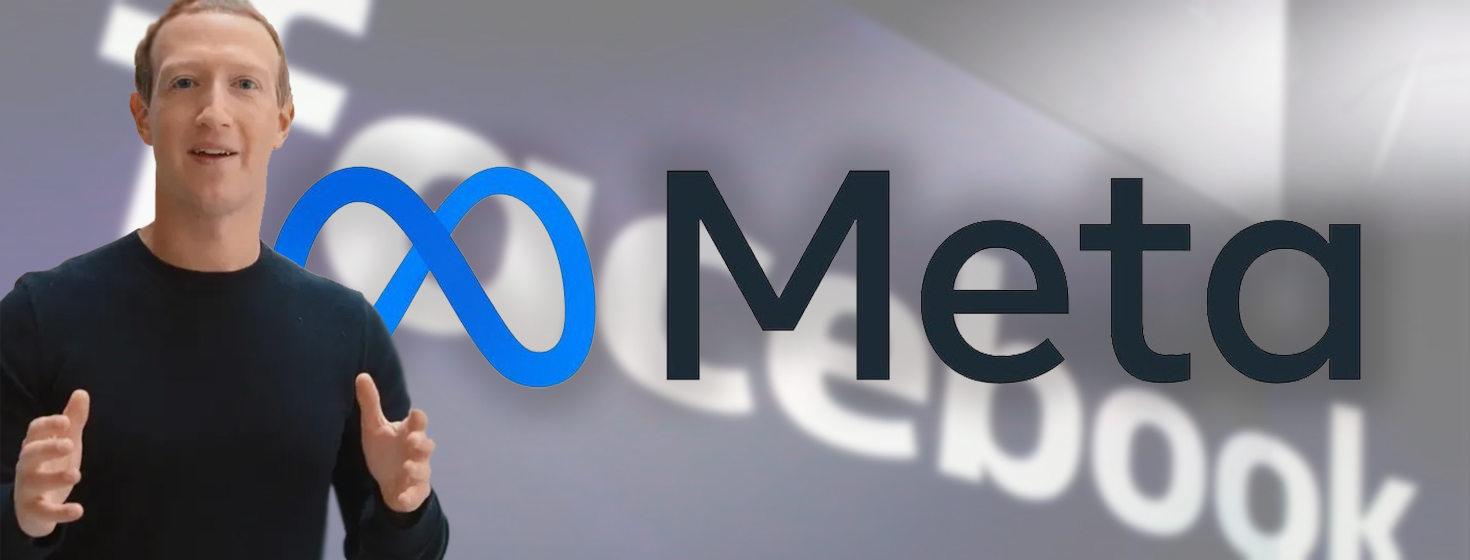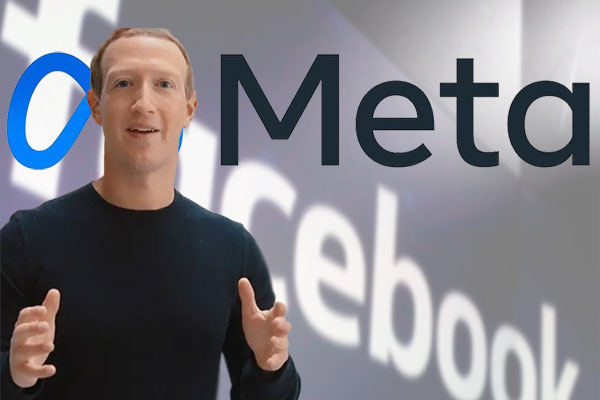Facebook CEO Mark Zuckerberg Announces it’s Changing its [Facebook] Name to “Meta”

At Facebook Connect, Mark Zuckerberg revealed a new company name, Meta, plus new VR and AR technologies the company is developing for the future.
Facebook is now Meta
As reported by The Verge Facebook CEO Mark Zuckerberg announced yesterday at the company’s Connect event that the company’s new name will be Meta.
“We are a company that builds technology to connect,” Zuckerberg said.
“Together, we can finally put people at the center of our technology. And together, we can unlock a massively bigger creator economy.”
“To reflect who we are and what we hope to build,” he added. He said the name Facebook doesn’t fully encompass everything the company does now and is still closely linked to one product. “But over time, I hope we are seen as a metaverse company.”
Zuckerberg owns the Twitter handle @meta (whose tweets are protected as of this writing) and meta.com, which now redirects to a welcome page on Facebook that outlines the changes.
As The Verge first reported on October 19th, the rebrand is part of the company’s efforts to shift gears away from being known as just a social media company to focus on Zuckerberg’s plans for building the metaverse. In July, he told The Verge that over the next several years, Facebook would “effectively transition from people seeing us as primarily being a social media company to being a metaverse company.”
Zuckerberg wrote in a blog post-Thursday that the company’s corporate structure would not be changing, but how it reports financial results will. “Starting with our results for the fourth quarter of 2021, we plan to report on two operating segments: Family of Apps and Reality Labs” he explained. “We also intend to start trading under the new stock ticker we have reserved, MVRS, on December 1. Yesterday's announcement does not affect how we use or share data.”
Facebook has been under intense scrutiny over the past several weeks, after revelations based on damning internal documents provided to the Wall Street Journal whistleblower Frances Haugen showed, among other things, that Facebook’s Instagram platform had become a toxic place for teenagers, especially girls. And antitrust regulators are pushing for the company to be broken up, as public trust in the social media platform is flagging.
On Monday, multiple news outlets published further details of the internal documents disclosed to the Securities and Exchange Commission and provided to Congress in redacted form. They showed the deep concern among Facebook’s researchers that its user base was aging, and the platform was losing traction among younger generations. The documents also showed Facebook had a tiered system to prioritize which countries would receive enhanced protections around elections.
Early speculation focused on a change similar to Google’s 2015 rebrand when it announced it would become one of several companies under the umbrella of a larger holding company called Alphabet. For Facebook, the original “blue” app would join Instagram, WhatsApp, and Oculus under a parent company.
The Greek word “Meta”
CNN Business reported that Zuckerberg, who said he loved studying classics in school, said the name was inspired by the Greek word meta, which means “beyond.” “For me, it symbolizes that there is always more to build.”
Facebook did not announce any executive changes on Thursday. But on Zuckerberg's personal Facebook page, his job title was changed to: “Founder and CEO at Meta.”
When asked by The Verge if he would remain CEO at Facebook in the next 5 years, he said: “Probably. I don't have a specific date for how long I want to be doing this. I guess what I could say is I'm very excited about the next chapter of what we're doing.
Zuckerberg also announced Messenger calling is coming to VR, plans to operate a virtual marketplace where developers can sell virtual goods and a new home screen in Oculus Quest to make chatting and games in the virtual world more social.
“Your devices won't be the focal point of your attention anymore,” he said.
“We're starting to see a lot of these technologies coming together in the next five or 10 years. A lot of this is going to be mainstream and a lot of us will be creating and inhabiting worlds that are just as detailed and convincing as this one, on a daily basis.”
A number of major companies have changed established brands over the years. Kentucky Fried Chicken shortened its name to KFC, Japanese car brand Datsun became Nissan. Some high-profile name changes have followed scandal or controversy. Philip Morris, the maker of Marlboro, changed its name to Altria, for example, and ValuJet became AirTran after one of its planes crashed in 1996.
Other name changes are intended to reflect the company's broader ambitions. Snapchat rebranded as Snap in 2016 to reflect its foray into hardware and Google restructured the company with a new name, Alphabet, and plans to grow a variety of business divisions.
How Social Media Benefits Supply Chain!
An article published by Supply Chain Game Changer™ describes perfectly the impact social media is having on the supply chain and the 4 ways social media benefits the supply chain;
1. Communicate
Supply chain companies often struggle with showing the more human side of their business. And with buyers continually seeking a more personal connection to brands, B2B companies have to get creative. Social media can help. Social networks allow leaders to communicate using language, images, and sound to create an inside look into your brand. With the ability to ask questions and engage with followers, social platforms help to create a community around your products and services.
2. Gain Insight
Unsure how you are holding up against your competitors? Want to learn about market expansion opportunities or new technologies in your industry? Social media can be your window into the supply chain world.
Not only can you see what topics and trends competitors are posting about, but you can benchmark your current digital marketing strategy against what other brands are doing. Making adjustments along the way will only help to make your marketing efforts more successful.
3. Educate
In a world congested with content, it’s important to make sure you’re joining social networks to add value to your followers. Creating posts that are educational, as well as entertaining, to audiences will establish your brand as a thought leader in the supply chain industry. Authors can either create these posts themselves or engage with a professional writing service for expert writing reviews.
Research the latest trends or cutting-edge technologies, highlight industry events, promote books or podcasts that offer high-value content that will leave your followers wanting more.
4. New Talent
The supply chain talent gap can be felt throughout the industry. In fact, more and more articles are being written about the crisis of hiring and, more importantly, retaining supply chain talent. According to statistics, using social networks like LinkedIn can help boost branding for your supply chain company.
And though branding might not come easily for some supply chain management executives, it is key in today’s digital world for positioning yourself as a thought leader in your industry, as well as gaining positive traction as an employer.
Final Thoughts
Don’t let the hype of social media deter you. A strong personal brand is a major asset to any supply chain company. It doesn’t have to be a chore. It can become a fun and fulfilling part of your work routine, and it pays off.
In 2015, Adrian Gonzalez, founder, and president of Adelante SCM wrote a brilliant article titled “The Social Side of Supply Chain Management” - Today, the principals and recommendations Gonzalez states are still very relevant to social media and the supply chain.
Related Article: The Social Side of Supply Chain Management
Article Topics
LEGACY Supply Chain Services News & Resources
Outsourcing eCommerce Fulfillment to a 3PL Rapidly Improve the Performance of Your Warehouse Logistics 20 Warehouse & Distribution Center Best Practices for Your Supply Chain Warehouse Contingency Planning Template 7 Last Mile Logistics Delivery & Ecommerce Trends You Don’t Want to Overlook Increase Inventory Visibility across Your Supply Chain and Optimize Omni-Channel Fulfillment Omni-Channel Logistics Leaders: Top 5 Inventory Insights More LEGACY Supply Chain ServicesLatest in Technology
South Korea Finally Overtakes China in Goods Exported to U.S. SAP Unveils New AI-Driven Supply Chain Innovations U.S. Manufacturing is Growing but Employment Not Keeping Pace The Two Most Important Factors in Last-Mile Delivery Spotlight Startup: Cart.com is Reimagining Logistics Walmart and Swisslog Expand Partnership with New Texas Facility Taking Stock of Today’s Robotics Market and What the Future Holds More Technology















